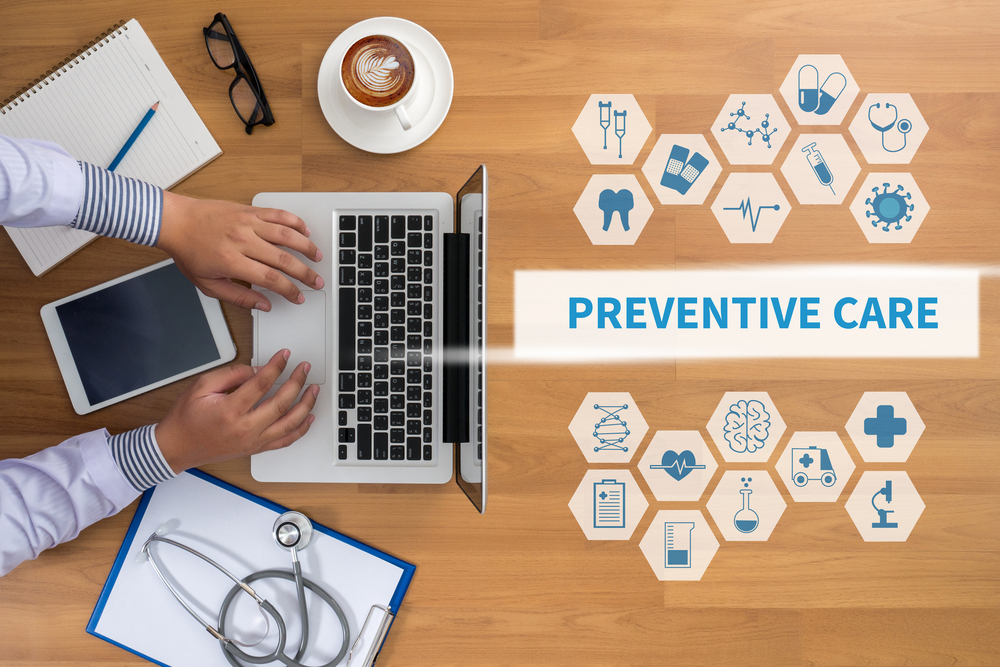
In our bustling modern lives, dedicating time to our health often takes a back seat. Yet, routine check-ups are not mere medical appointments but a fundamental investment in one’s overall well-being. Private Health insurance emerges as a vital force, motivating individuals to prioritise preventive care. Routine health check-ups are instrumental in detecting early signs of potential health issues. Identifying problems at an early stage significantly enhances the effectiveness of subsequent treatments.
The frequency of check-ups is influenced by various factors, including your age, overall health, family medical history, and the lifestyle choices you make. These elements collectively determine how often you should undergo health examinations. Let’s explore the importance of preventive healthcare and how health insurance drives toward a healthier and more contented life.
Early Detection Saves Lives:
Regular health checks are essential, even if you feel well, as they serve multiple purposes:
- Identification of Current or Emerging Medical Problems: Regular check-ups help detect existing or potential medical issues early. Timely identification allows for prompt medical intervention and appropriate management.
- Assessment of Future Health Risks: These visits assess your risk factors for future health problems. By evaluating your overall health, medical professionals can guide you to mitigate potential risks and prevent future illnesses.
- Encouragement for Healthy Lifestyle: Health check-ups serve as a reminder to maintain a healthy lifestyle. Healthcare professionals can advise on diet, exercise, and other habits, motivating you to make positive health changes.
- Vaccination Updates: Regular visits ensure your vaccinations are up-to-date. Staying current with vaccinations is crucial for preventing various diseases and maintaining immunity.
Health checks are typically integrated into routine medical care and may coincide with visits related to other health concerns. Your doctor will determine the frequency of these checks based on your health needs. Additionally, these appointments allow you to reflect on your lifestyle choices, enabling discussions with healthcare professionals about potential improvements you can make to enhance your overall health.
It’s important to note that your doctor might recommend additional tests based on your specific health condition and medical history. Healthcare professionals tailor their recommendations to individual needs, ensuring a personalised approach to your healthcare. Therefore, following your doctor’s advice and undergoing any additional tests they suggest to maintain your overall well-being is crucial. Regular communication with your healthcare provider will help you stay informed about your situation’s necessary screenings and tests.
Here is a list of health checks that should be done.
Health Checks For Diabetes
Health checks for diabetes are vital due to the seriousness of this condition, characterised by elevated blood glucose levels, which can lead to severe complications if left unmanaged. These tests, typically conducted by healthcare professionals, include a laboratory blood glucose test ordered by your doctor. The most common test is the fasting blood glucose test, where you refrain from food or fluids (except water) for eight hours beforehand. Additional tests can be taken at any time during the day without preparation, a glycosylated haemoglobin (HbA1c) test or an Oral Glucose Tolerance Test (OGTT).
It's crucial to consult your doctor regarding diabetes risk assessment and the required test frequency. Your risk of developing type 2 diabetes in the next five years can be evaluated using the Australian type 2 diabetes risk assessment tool (AUSDRISK), a brief questionnaire. AUSDRISK can be completed independently or with the assistance of a healthcare professional or practice nurse. Regular assessments and tests are essential for timely diagnosis and effective diabetes management
Screening for Sexually Transmitted Infections
Screening for sexually transmissible infections (STIs) is essential for sexually active individuals. Regular testing for chlamydia is recommended annually for individuals aged 15 to 29, and this can be done through a straightforward urine test. It's crucial to note that chlamydia is highly prevalent and may not always exhibit symptoms.
For those at risk of other STIs like HIV/AIDS or herpes, consulting a healthcare professional is advisable for additional testing and guidance.
Health Checks for Bowel Cancer
Screening for bowel cancer is crucial for individuals aged 50 to 74, even if they do not display any symptoms, as it aids in early cancer detection. The screening process involves analysing a bowel motion sample for blood, which could indicate the presence of bowel cancer.
Individuals with a family history of bowel cancer should consult their doctors to determine the appropriate screening options tailored to their situation. Those at higher risk may necessitate a colonoscopy every five years. This procedure involves the use of a slender device called a colonoscope, which is inserted through the anus. It allows doctors to visually inspect the rectum and large bowel for abnormalities, ensuring comprehensive screening for potential health issues.
Health Checks for Eye Conditions
Regular eye check-ups are vital, significantly, as eyesight declines with age. Serious eye conditions like glaucoma, cataracts, diabetic retinopathy, and macular degeneration become more prevalent as individuals grow older.
For those aged 65 and above, it is recommended to undergo an annual eye examination. However, individuals with specific risk factors, such as a family history of eye disease, a personal history of eye conditions or injuries, certain medical conditions like high blood pressure or diabetes, and those taking particular medications might need more frequent testing.
Moreover, an annual eye test is essential if you already wear prescription glasses or contact lenses. For adults without prescription eyewear, an eye examination every two years is advisable to ensure optimal eye health. Regular check-ups are crucial for early detection and timely management of potential eye issues.
Health Checks For Bone Health
Bone health is crucial, especially as you age. Osteoporosis poses a significant risk, affecting both men and women. To assess your bone health, a bone density test is essential. Typically, individuals over the age of 50 should consider undergoing this test to evaluate the density and strength of their bones. Regular assessments are vital for maintaining strong and healthy bones as you age.
Recognising and comprehending the unique health experiences and outcomes based on gender is pivotal. Understanding these distinctions is crucial for enhancing outcomes and the overall quality of life for everyone in Australia. By acknowledging the diverse health needs and challenges faced by different genders, healthcare providers and policymakers can tailor their approaches, ensuring that healthcare services are equitable and effective for everyone, regardless of gender. This inclusivity promotes better health outcomes and fosters a more inclusive and supportive society for all individuals
Regular Health Checkups for Women.
Regular health check-ups are essential for women to ensure their well-being. These routine screenings are vital in monitoring overall health and detecting potential issues early, allowing for timely interventions and promoting a healthier lifestyle.
Breast Cancer Screening
Breast cancer screening is crucial for Australian women, given its prevalence, especially among those over 60. Detecting breast cancer early significantly enhances the chances of successful treatment and survival. For those in their 40s or over 75, it's advisable to consult a doctor to assess the risks and benefits of screening. The screening program does not cover women under 40. Regardless of age, it's essential to promptly consult a doctor if any breast symptoms or changes in appearance or texture are noticed. Early detection can make a significant difference in treatment outcomes.
Cervical Cancer Screening
Regular cervical screening tests are essential for the early detection and prevention of cervical cancers. It is recommended for women and individuals with a cervix aged 25 to 74 years who have ever been sexually active. The cervical screening test, which replaced the pap test, checks for the presence of the human papillomavirus (HPV), a virus linked to cervical cancer. It's important to note that even if someone has been vaccinated against HPV, regular cervical screening is still necessary, as the vaccine does not protect against all HPV types. Starting from July 2022, eligible individuals can opt for self-collection, a safe and effective method of testing, where they collect their own vaginal sample for screening. This option enhances accessibility and encourages more people to participate in cervical screening, promoting women's health.
Pregnancy Tests
Before planning a pregnancy, it's essential to have a general check-up to address any potential health risks during pregnancy. Once you're pregnant, regular antenatal checks are crucial to monitor your baby's development, identify abnormalities, and assess your overall health.
Various tests may be conducted during pregnancy, including ultrasound scans, urine tests, blood tests, and genetic testing. While some tests are recommended for all pregnant women, others are specifically designed for those at higher risk of complications. Following your doctor's advice is essential to ensure a healthy pregnancy and safe delivery.
Private health insurance is advantageous as it covers essential tests during pregnancy. Comparing your plan with Health Deal can help determine if your insurance policy includes pregnancy-related expenses. Pregnancy often brings unforeseen financial challenges, and insurance can alleviate some of the strain, offering peace of mind regardless of the uncertainties.
Health Checks For Men
Men should incorporate regular health checks into their routine to maintain good health and identify potential issues early on. This proactive approach is crucial for overall well-being.
Prostrate Cancer Screening
Consult your doctor about prostate cancer testing. Routine testing for all men is not advisable. Considering your individual risk factors for the disease, it's essential to weigh the benefits, risks, and uncertainties associated with testing.
Health Checks for Older People
As you age, prioritising your health becomes increasingly crucial. Regular health check-ups tailored for older individuals can significantly enhance your well-being. It's essential to consult your doctor about various screenings and immunisations, ensuring you stay proactive about your health:
- Abdominal Aortic Aneurysm Screening: If you're a former or current smoker, especially as an older man, consider an ultrasound to screen for abdominal aortic aneurysms, a bulge in the major blood vessel in your abdomen.
- Blood Pressure Screening:Conducted annually or more frequently if you have diabetes, heart disease, kidney issues, or other relevant conditions.
- Bowel Cancer Screening:Undergo a simple test for signs of bowel cancer every two years if you're over 50.
- Cholesterol Screening and Heart Disease Prevention:Recommended every five years with normal levels. If you have high cholesterol, diabetes, heart disease, kidney problems, or other related conditions, more frequent checks might be necessary..
- Diabetes Screening:Get screened every three years. If you're overweight with additional diabetes risk factors, consult your doctor about more frequent screenings.
- Lung Cancer Screening:Particularly essential for current smokers and those who quit within the past 15 years..
- Osteoporosis Screening: If you have risk factors such as long-term steroid use, low body weight, smoking, heavy alcohol use, or a family history of osteoporosis, discuss screening options with your doctor.
- Physical Exam: Undergo a physical exam annually or as your doctor advises. This includes weight, height, and BMI measurements.
- Pneumococcal Vaccine: If you haven't had one or have been more than five years since your last dose.
- Annual Flu Shot: Protect yourself against seasonal influenza.
- Tetanus-Diphtheria-Pertussis (Tdap) Booster: Every ten years.
- Shingles or Herpes Zoster Vaccine: Discuss with your healthcare provider.
Regular check-ups with dental, eye, and hearing professionals are also vital. Dental exams should occur yearly or as recommended; eye tests every one to two years if you have vision issues or glaucoma risk, and hearing tests if you experience hearing loss symptoms. Stay proactive about your health to enjoy a fulfilling and healthy life in your golden years.
Cost-Effective Wellness:
Many health insurance plans offer a range of preventive services for the insured at little to no cost. This includes vaccinations, screenings, and counselling services. By encouraging members to utilise these services, health insurance companies promote healthy living while reducing healthcare expenditure. Preventive care is not just about saving lives; it's also about saving money in the long run.
Building a Health-Conscious Society:
Health insurance providers play a pivotal role in shaping a health-conscious society. Covering preventive services and promoting regular check-ups instils a sense of responsibility among individuals regarding their health. This, in turn, leads to a more informed and proactive community that understands the value of early intervention and regular health assessments.
The importance of health insurance for regular check-ups cannot be overstated, especially when considering the necessity of comprehensive coverage. Individuals must evaluate their insurance policies to ensure they are adequately covered for these essential health assessments. Health insurance provides a safety net, allowing individuals to prioritise their health without worrying about the financial burden of medical expenses.
Comparing health insurance policies is vital in this process, ensuring that the chosen policy aligns with an individual’s specific healthcare needs. Health Deal, as a private health insurance comparator agency, plays a pivotal role. Their invaluable service, offered free of charge, allows individuals to assess various insurance options, making an informed decision about their coverage.
By utilising Health Deal‘s services, individuals can confidently select a health insurance policy that covers regular check-ups and offers additional benefits, enhancing their overall well-being. This proactive approach safeguards financial stability and promotes a proactive attitude towards health, encouraging individuals to engage in regular health check-ups and preventive care.
In essence, getting health insurance and choosing the right policy, with the assistance of services like Health Deal, ensures that individuals have access to the best healthcare services, empowering them to lead healthier lives and contribute to a healthier society.


 Single
Single Couple
Couple Family
Family Single Parent
Single Parent